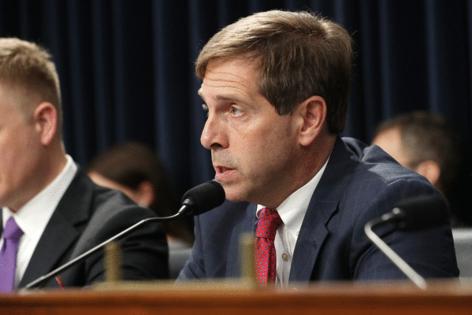House Republicans voice concern over DOE nuclear, research cuts
Published in News & Features
WASHINGTON — House Energy-Water Appropriations Chair Chuck Fleischmann told Energy Secretary Chris Wright on Wednesday that he wanted to see more money in fiscal 2026 for the Office of Science, a sharp contrast to the administration’s request for a cut of more than $1 billion.
In Wright’s debut in the House on Wednesday to defend the Trump administration’s energy budget, he encountered resistance from even some Republicans about cuts to nuclear and science programs.
The White House’s so-called skinny budget for fiscal 2026 requested $45.1 billion for the Energy Department, about 9% less than enacted for fiscal 2025. The administration is expected to release a more detailed budget request later.
The majority — more than $15 billion — of the requested cuts would fall on clean energy programs enacted in the 2021 infrastructure law, but the administration also proposed decreases in funding for some nuclear activities and waste cleanup programs.
Fleischmann, R-Tenn., said he hoped to work with Wright on the Office of Science budget to “see some type of increase there.” The administration asked for a $1.1 billion cut for the office, which leads scientific research on energy. The administration also asked for a $408 million cut to the Office of Nuclear Energy.
“I’m glad to see the department plans to focus on developing innovative concepts for nuclear reactors and researching advanced nuclear fuels. I do have some concerns, candidly, with the proposed reduction to the nuclear energy budget,” Fleischmann said. “We’re at a pivotal moment in the development of our nuclear energy technologies in the United States, the success of which are critical to regaining international dominance in the nuclear market for our own domestic energy security.”
Wright said the reduction in nuclear funding “in no way indicates a . . . reduction in desire for nuclear energy.” He added the production of nuclear energy is especially important for U.S. dominance in artificial intelligence and other energy-intensive technologies.
“If we are lagging, if we’re behind China in AI, our sovereignty, our national defense, is at risk. I think it is not an option for us to get second in AI,” he said. “We have to enable the dramatic growth of American energy production if we are to lead on AI.”
Rep. Mike Simpson, R-Idaho, voiced concerns that decreased funding would slow the cleanup of toxic waste sites left behind by activities extending from the Manhattan Project in World War II through the end of the Cold War. The White House pitched a $389 million cut for that funding under DOE’s Environmental Management account.
Simpson’s district is home to the Idaho National Laboratory, established in 1949 and, for many years, the site of the largest concentration of nuclear reactors in the world. The laboratory is one of the sites on the DOE’s cleanup program.
“The total reduction in the environmental management budget is actually quite small, and our firm belief is that through efficiency, through doing things smarter, there won’t be any slowdown,” Wright said. “That’s why I’m here — is to take up a department that hasn’t really been run like a business, and run it like a business.”
Aside from budget concerns, Wright said he would work with lawmakers to support other energy sources, including geothermal, hydropower and high-assay low-enriched uranium.
Democrats pressed Wright on alleged pauses to projects such as hydrogen hubs designed to speed up commercial-scale deployment of clean hydrogen, and on layoffs at the DOE.
Wright said the DOE hasn’t frozen any funding and that fewer than 1,000 employees have left the department since he joined it. He added that the department is “in flux right now” as he looks to “restructure” it to make it more efficient.
“If we have an ongoing project for an existing commitment and work is being done, we’ve paid our bills, all of our bills,” he said. “We are reviewing existing projects. We’ve canceled zero so far, much to the frustration of people on the other side as well.”
Rep. Debbie Wasserman Schultz, D-Fla., pushed back on Wright’s claim that the department hasn’t held up funding and referred to a list of paused funds that she said added up to $67 billion.
“I think your information is not correct, congresswoman, and we should follow up,” Wright said. “We administer funds that are appropriated by Congress through hundreds, in fact, in thousands of contracts with various players that are on the other end of those deals . . . and we are engaging with all of those folks on the next milestones for their payments.”
_____
©2025 CQ-Roll Call, Inc., All Rights Reserved. Visit cqrollcall.com. Distributed by Tribune Content Agency, LLC.







Comments